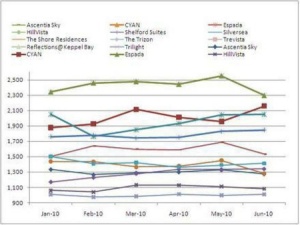insight
工程技術,地產投資,信仰家園,時尚生活With the interest rate on savings near zero and not able to beat even Singapore’s benign inflation, forecast at 2.5 to 3.5 per cent by the Monetary Authority of Singapore, many are looking to work their savings harder by buying an investment property.
Having decided that, the next question is whether to invest in a new property bought from the developer or a unit from the resale market.There are arguments for both.
Buying from Developers
Brand new property. Being the first owner, the investor does not have to worry about the history of the unit, its previous owners or occupants.
Progressive payments. The investor may be better able to manage his finances. The loan draw down is staged and the instalments start low,allowing one to build up the nest-egg during construction. If one’s investment time horizon is short, say two years, one can sell into arising market and make a profit even before the substantial draw down on bank loan when the Temporary Occupation Permit is issued. Developers may also tie up with banks to offer attractive financing packages for home buyers.
Defects liability period. The developer guarantees against defects for the first 12 months from TOP.
Early bird discounts. These can often be enjoyed at developers’previews. Some developers may offer special prices for investors who are willing to commit even before the show flats are ready. Developers always step up prices, or reduce discount levels, when the pace of sales is strong, so early buyers stand to make paper gains quickly.
Choice units. If you get ahead of the queue, all the units that are released are available for your selection.
Configurable. In a limited way, many developers allow room for making minor adjustments. The most common features are selection of materials, tiles, finishes, etc. But it could be more substantial, such as an open versus closed kitchen, or say, the removal of a plunge pool at the rooftop terrace. At the extreme, Far East Organization’s bespoke condominium called Boulevard Vue offers a white plan for individual customisation and “the luxury of creating interior spaces that mirror your personal preferences and taste” (quoted from developer’s website).Such customisation was previously only available if we built our own landed home.
Investing In Tenanted Apartments
Low upfront commitment as simplified by the catchphrase “1+4, not5+15!”. Buying a new unit from a developer requires a 5 per cent option fee and 15 per cent more eight weeks after exercising the option to purchase. This is in line with practices allowed by the Controller of Housing at the Urban Redevelopment Authority. In the case of a resale transaction, the buyer normally pays a 1 per cent option fee and 4 percent more to exercise.
Immediate income stream. Despite the relatively low yields of Singapore residential properties, most tenanted homes yield positive cash flow for the landlords, thanks to cheap mortgages.
Significant discounts. Older resale properties often trade at significant discounts to new launches on the same street. There are many examples to support this point, say, around Raffles Place and Shenton Way, along Grange Road, Nassim Road, in Serangoon, East Coast,West Coast, Pasir Panjang, and River Valley, etc. The price gaps between new launches and properties more than five years old in the same street, or even sharing the same perimeter wall, can range from 5per cent to 50 per cent, or from $100 to $1,500 psf. For 99-year leasehold properties, one might further discount based on the age of the lease, but examples abound for freehold properties too. Given that construction costs range from $300 to $500 psf for luxury properties,if the cost of an older property is lower than its recently launched neighbours by a gap of $500 psf, then one could take a view that the older property was purchased at land cost, and the buildup area was given free.

Developers’sales prices are peakish. Anecdotal evidence from URA data (see graph)indicates that a majority of investors who have bought from developers’launches this year have yet to make paper gains despite the more than10 per cent rise in the URA Private Property Index over the same period. The PPI increase was most likely due to the price gains from resales and landed properties.
En bloc potential. With the rebound in sentiment and collective sales coming back into favour, the en bloc potential must not be ignored. But the investor must do his homework and ask for evidence that the project is indeed a likely, economically feasible, candidate.
As is, where is. What you see is what you get. The investor is buying a completed apartment, flaws and gems all included. There is no guesswork as to the quality of the workmanship and the finishes that will be delivered, unlike with new apartments.
The overall trend in the Singapore home market may be up but confidence is still lacking in some quarters. Global economic uncertainties loom and Singapore is not immune.
For now though, I would recommend properties that are under-valued relative to their neighbours, minimising downside risks and collecting steady rental income.
By Ku Swee Yong, founder of real estate agency International Property Advisor (IPA)



